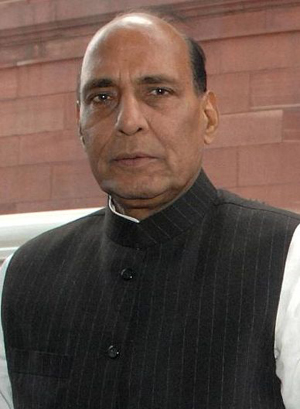KATHMANDU, Sept 19: India today voiced concern over the new threats of terrorism and violence posed to South Asia especially after the withdrawal of foreign forces from Afghanistan this year and asked SAARC countries to chalk out strategies to check radical groups and extremist ideologies.
Addressing the sixth meeting of SAARC Interior and Home Ministers here, Home Minister Rajnath Singh said South Asian countries need to carefully assess the impact on the entire region of the withdrawal of foreign forces from Afghanistan.
“We all share a common and indeed vital stake in peace, stability and economic development in Afghanistan. We are naturally concerned by new threats of extremism, terrorism and violence being held out to South Asian countries like India, Bangladesh and Sri Lanka, which cannot but raise concerns,” he said.
Singh said groups with radical and extremist ideologies do pose threats across national boundaries, in this volatile security environment and these groups even have no compunction in issuing threats publicly against neighbouring and regional countries.
He said a major issue that concerns all South Asian nations is terrorism, which is driven by internal, regional and international factors, within and across national boundaries.
Singh said there was sea change in the strategic environment in the neighbourhood with the emergence of a new dispensation in Afghanistan following the 9/11 terror attacks in the US.
“The international community has lent unprecedented support to the democratically elected Government of Afghanistan. It is our hope that this will continue,” he said.
Most NATO troops are due to withdraw from Afghanistan by the end of this year as the US-led war effort against the Taliban winds down.
The Home Minister asked the SAARC member countries to ponder over how to chalk out strategies to deal with the menace of terrorism which involves not just violent activities but also economic destabilisation.
“Moreover, it is imperative that all South Asian states should introduce legislation that enables stringent punishment of individuals, organisations and publications that advocate and incite terrorism and violence, across national boundaries,” he said.
The Home Minister said India’s focus is on the need for countries to adopt comprehensive enabling legislation and also for the inclusion of offences under domestic law, strengthening extradition procedures and providing courts effective jurisdiction to prosecute offenders, when extradition is not granted.
“Some member states are yet to ratify the Convention on Mutual Assistance on Criminal Matters, which was signed in 2008. I would urge them to do so to enable the widest possible mutual legal assistance in criminal matters,” he said.
Singh said New Delhi was committed to securing justice for the families of the victims of deadly terrorist strikes, like the Mumbai attack in November 2008.
He said another issue which has become a matter of concern for all nations is the increasing circulation of counterfeit currency in the region.
“I must particularly thank our hosts in Nepal for the cooperation they have extended to us, in dealing with the movement of counterfeit currency, across our borders,” he said.
The Home Minister said India has been facing serious problems arising from drug smuggling in states located along international borders, like Punjab, and this menace afflicts not only countries where narcotic substances are produced but also beyond their borders.
“Funds from such smuggling often finance terrorism. We need to strengthen domestic legislation and cooperate even more to implement the ‘Regional Convention on Narcotic Drugs and Psychotropic Substances’, while enhancing multilateral cooperation globally, as drug smuggling inevitably has global dimensions,” he said.
Singh said the SAARC Interior and Home Ministers’ Conference provides the opportunities to discuss other issues of common interest like cyber crime, human trafficking and illegal movement of arms across national boundaries.
“I think we all acknowledge that one evil which we all need to address individually and collectively is the issue of corruption. We have promised our people a policy of ‘zero tolerance for corruption’,” he said.
The Home Minister also suggested to establish a ‘SAARC Centre for Good Governance’ where the administrative officers from all member countries could come together to exchange their experiences pertaining to development and good governance.
“It will not only strengthen the positive trends of development in South Asia but also help in realising our shared dream of good governance,” he said.
Singh said the first order of business of Prime Minister Narendra Modi was to assure the SAARC nations individually and collectively of the importance India placed in working together with them, for the welfare and well being of the people.
“The very first bilateral visits of the Prime Minister were to our two Himalayan neighbours, with whom we have open borders and enjoy close ties – Bhutan and Nepal. I would like to reiterate that our commitment is to give primacy to improving our relations with all our SAARC neighbours,” he said.
The Home Minister referred to the decisions taken at the 11th SAARC Summit in Kathmandu on January 4-6, 2002, when the leaders set a long term vision on how the nations would move ahead on the shared goal of economic prosperity for the people.
“We then agreed to finalise the text of a Free Trade Agreement by the end of the year and implement the vision of a phased and planned process, eventually leading to a South Asian Economic Union. This was the cherished dream of our then Prime Minister Atal Bihari Vajpayee, who even spoke of establishing a South Asian Monetary Union,” he said. (PTI)
Trending Now
E-Paper


